
Alexander Pollak (born July 16, 1973, in Vienna) is an Austrian historian, author and human rights campaigner. [1] [2]

Alexander Pollak (born July 16, 1973, in Vienna) is an Austrian historian, author and human rights campaigner. [1] [2]
During his doctoral studies, Pollak worked on the Wittgenstein research focus "Discourse, Politics, Identity", led by the Austrian linguist Ruth Wodak. He explored the image of the Wehrmacht in newspapers and documentaries. To this end, he published a book called The Wehrmacht legend. Pollak spent five years as the head of anti-discrimination projects at the European Union Agency for Fundamental Rights (FRA). In 2003, he started as a radio producer at the free Viennese radio station Orange 94.0 where he designed programs for the political magazine Radio Voice. Pollak received the "Radio Prize of Adult Education" for this work.
In 2005, Pollak joined the European Monitoring Center on Racism and Xenophobia (EUMC), which in 2008 was transformed into the European Union Agency for Fundamental Rights (FRA). Pollak acted as project leader for anti-discrimination projects. In early 2011 Pollak took over the position as spokesman and co-CEO of the Austrian human rights organization SOS Mitmensch. [3] Pollak has contributed to media reports. [4]
Shortly before the Austrian parliamentary elections in 2013 Pollak was instrumental in supporting people without Austrian citizenship. [5] [6]
Pollak authored work that investigated how the war crimes of the Wehrmacht were covered up by the printed media in the aftermath of World War II. [7]
The German 10th Infantry Division was created in October 1934 under the cover name Wehrgauleitung Regensburg to hide its violation of the Treaty of Versailles. It was renamed the 10th Infantry Division when the establishment of the Wehrmacht was announced publicly in October 1935.
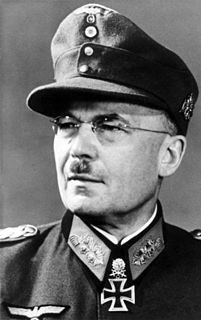
Lothar Rendulic was an Austrian army group commander in the Wehrmacht during World War II. Rendulic was one of three Austrians who rose to the rank of Generaloberst in the German armed forces. The other two were Romanian-born Alexander Löhr and Erhard Raus from Moravia.
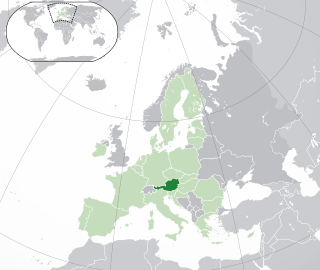
Lesbian, gay, bisexual, and transgender (LGBT) rights in Austria have advanced significantly in the 21st century. Both male and female same-sex sexual activity are legal in Austria. Registered partnerships were introduced in 2010, giving same-sex couples some of the rights of marriage. Stepchild adoption was legalised in 2013, while full joint adoption was legalised by the Constitutional Court of Austria in January 2015. On 5 December 2017, the Austrian Constitutional Court decided to legalise same-sex marriage, and the ruling went into effect on 1 January 2019.
The European Union Agency for Fundamental Rights, usually known in English as the Fundamental Rights Agency (FRA), is a Vienna-based agency of the European Union inaugurated on 1 March 2007. It was established by Council Regulation (EC) No 168/2007 of 15 February 2007.
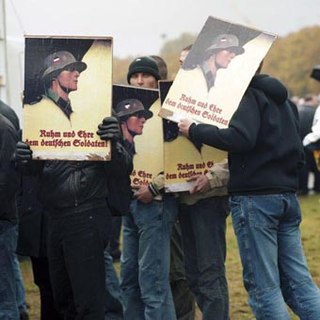
The Wehrmacht exhibition was a series of two exhibitions focusing on the war crimes of the Wehrmacht during World War II. The exhibitions were instrumental in furthering the understanding of the myth of the clean Wehrmacht in Germany. Both exhibitions were produced by the Hamburg Institute for Social Research; the first under the title "War of Annihilation. Crimes of the Wehrmacht 1941 to 1944", which opened in Hamburg on 5 March 1995 and travelled to 33 German and Austrian cities. It was the subject of a terrorist attack but the organizers nonetheless claimed it had been attended by 800,000 visitors. The second exhibition – which was first shown in Berlin in November 2001 – attempted to dissipate considerable controversy generated by the first exhibition according to the Institute.
Ruth Wodak is an Austrian linguist, who is Emeritus Distinguished Professor and Chair in Discourse Studies in the Department of Linguistics and English Language at Lancaster University and Professor in Linguistics at the University of Vienna.
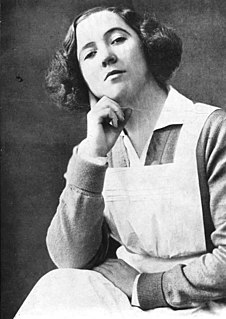
Claire Waldoff, born Clara Wortmann, was a German singer. She was a famous kabarett singer and entertainer in Berlin during the 1910s and 1920s, chiefly known for performing ironic songs in the Berlin dialect and with lesbian undertones and themes.
The political parties used numerous campaign posters in the 2008 Austrian legislative election.

Hans Georg Heer is a German historian, chiefly known for the Wehrmachtsausstellung in the 1990s. While controversial at that time, the exhibition is nowadays widely credited with opening the eyes of the German public to the war crimes of the Wehrmacht committed on the Eastern Front during World War II. Having been suspended in 1999 for review, the exhibit reopened in 2001 under the name "Crimes of the German Wehrmacht: Dimensions of a War of Annihilation 1941–1944". The exhibitions were instrumental in the debunking of the myth of the clean Wehrmacht in Germany.

Gudrun Veronika Kugler, née Lang, also known as Kugler-Lang, is a Roman Catholic theologian, jurist, and ÖVP-member of Austria's National Council.
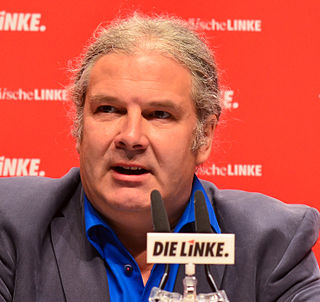
Andrej Konstantin Hunko is a German politician. He has been a member of the German Bundestag since 2009 and a member of the Parliamentary Assembly of the Council of Europe (PACE) since 2010. He has been deputy chairman of the Unified European Left parliamentary group since 2015 and deputy chairman of the Left parliamentary group in the Bundestag since 2020. He has been a member of the Executive Committee of the Left party since 2014.

Ute Bock was an Austrian educator who was known for her projects helping asylum seekers.
Evidence for the presence of Jewish communities in the geographical area today covered by Austria can be traced back to the 12th century. In 1848 Jews were granted civil rights and the right to establish an autonomous religious community, but full citizenship rights were given only in 1867. In an atmosphere of economic, religious and social freedom, the Jewish population grew from 6,000 in 1860 to almost 185,000 in 1938. In March 1938, Austria was annexed by Nazi Germany and thousands of Austrians and Austrian Jews who opposed Nazi rule were sent to concentration camps. Of the 65,000 Viennese Jews deported to concentration camps, only about 2,000 survived, while around 800 survived World War II in hiding.

Mohr im Hemd is an Austrian dessert. It consists of a chocolate pudding topped with whipped cream, hence the name.

Presidential elections were held in Austria on 24 April 2016, with a second round run-off on 22 May 2016. However, the results of the second round were annulled and a re-vote took place on 4 December 2016.

The myth of the clean Wehrmacht is the negationist notion that the regular German armed forces were not involved in the Holocaust or other war crimes during World War II. The myth, heavily promoted by German authors and military personnel after World War II, completely denies the culpability of the German military command in the planning and perpetration of war crimes. Even where the perpetration of war crimes and the waging of an extermination campaign, particularly in the Soviet Union – where the Nazis viewed the population as "sub-humans" ruled by "Jewish Bolshevik" conspirators – has been acknowledged, they are ascribed to the "Party soldiers corps", the Schutzstaffel (SS), but not the regular German military.
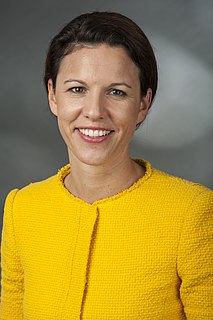
Katja Isabel Leikert is a German politician of the Christian Democratic Union (CDU) who has been serving as a member of the Bundestag since 2013, representing the Hanau electoral district. Within the CDU/CSU Bundestag Group, parliamentary colleagues elected her one of the alliance's eleven Bundestag deputy chairpersons in January 2018.

Lydia Benecke is a German criminal psychologist and writer of popular science non-fiction.
Guidelines for the Conduct of the Troops in Russia was a "criminal order" issued on 19 May 1941, during World War II. The guidelines detailed the expected behaviour of German troops during the Invasion of the Soviet Union. Civilians were included as opposition groups. The order states "Bolshevism is the deadly enemy of the National Socialist German people. This corrosive Weltanschauung – and those who support it – are what Germany’s struggle is against. This struggle demands a ruthless and strenuous crackdown on Bolshevik agitators, irregulars, saboteurs and Jews, and the complete elimination of both active and passive resistance. The Asiatic soldiers, in particular, are inscrutable, unpredictable, underhand and unfeeling".
Criminal orders is the collective name given to a series of orders, directives and decrees given during the invasion of the Soviet Union in World War II by the Wehrmacht High Command. The criminal orders went beyond established codes of conduct and led to widespread atrocities on the Eastern Front.